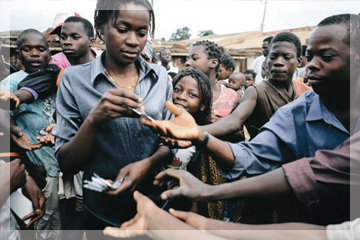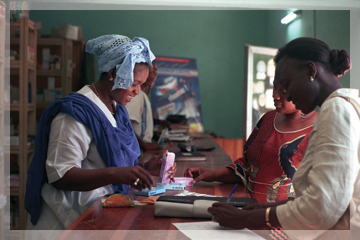International Access to
Family Planning and Reproductive Health

Condom distribution in Chimoio village, Mozambique. Photo by Gideon Mendel, courtesy of the International HIV/AIDS Alliance.
The developing world faces daunting challenges in reproductive health, perhaps most acutely in sub-Saharan Africa. There, high fertility rates, a lack of reproductive rights, and heavy demand for contraceptive services have prompted us to expand our programs. We also work to encourage donors and national governments to support advocacy, training, research, and services for those who need them most. In 2007, the Program focused on three strategies:
Improving the choices of contraceptive methods for more people. Our goal in 2007 was to increase the number of clients able to take advantage of high-quality family planning and safe abortion services, and grantees were overwhelmingly successful in achieving it. Visits to health-care providers for contraception increased by 20 percent over the previous year, to 30 million, and more than 6,500 health professionals received clinical training in safe abortion care, up from 4,000 the previous year. Grantees also launched a nationwide campaign in Kenya to increase familiarity with and use of emergency contraception.
Fostering policies and laws that endorse family planning. In 2007, the Foundation supported research in Kenya to help clients transition from emergency contraception to the regular use of contraception, and made a grant to the Dutch organization Oxfam Novib to encourage the use of a new generation of female condoms.
The Program’s grantees had broad success in advancing sound family planning policy, including leading a public debate in Kenya concerning abortion laws, and working with government officials to revitalize Rwanda’s family-planning program.
Strengthening the connections between programs that provide family planning and reproductive health services and those that provide HIV/AIDS services. It seems appropriate that the services that help protect people against sexually transmitted diseases like HIV/AIDS should also address the broader issue of good reproductive health. Surprisingly, these services are rarely linked. Clients seeking HIV/AIDS treatment seldom receive information about family planning or other sexual health issues.
Two demonstration projects—in Mozambique and South Africa—were set up to test the distribution of reproductive-health information and services to HIV/AIDS clients. Foundation grantees are working to develop programs that meet family-planning and reproductive health needs within major international HIV/AIDS funding mechanisms, including the President’s Emergency Plan for AIDS Relief and The Global Fund.
All of our efforts are directed toward addressing the root causes of problems that prevent women from being able to obtain the quality family-planning and reproductive-health services that they want and need. We fund activities that are sustainable and that can be expanded by governments and other large funders. It is in these two areas that we face our greatest challenges. The Foundation recognizes that our efforts alone are not sufficient. African governments, with support from other international funders, must take the lead in pushing good policies and practices. While some African countries are demonstrating this leadership and some funders are fulfilling their commitments to supporting family planning and reproductive health, we acknowledge that other countries have fallen short.
International Access to Family Planning and Reproductive Health Grants authorized in 2007.
2008 Goals
- Increase general knowledge and use of contraceptive methods among men and women of reproductive age, including emergency contraception, intrauterine devices, and female condoms
- Train health professionals to provide a greater range of contraceptives to clients
- Advance policies that will expand access to legal and safe abortion services
- Encourage more sub-Saharan countries to join the regional initiative of Partners in Population and Development, an intergovernmental organization that promotes population issues as well as family planning and reproductive health
- Expand contraceptive services by emphasizing the connection between family planning and reproductive health and HIV/AIDS
For more information, please visit the Foundation Web site.




